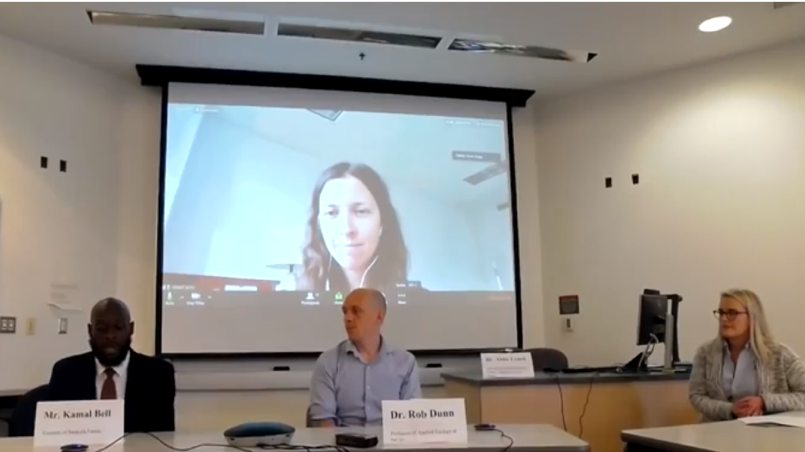Experts Examine Challenges of Food Production Under Climate Change

This post was written by Laura Hamon, 2018-19 Global Change Fellow. It summarizes the second of the Global Change Seminar series organized by the Global Change Fellows on November 1, 2018, a panel discussion on impacts of shifting temperature and precipitation patterns on agriculture and aquaculture production.

Panelists:
Dr. Abby Lynch: Research Fish Biologist, USGS
Mr. Kamal Bell: Founder of Sankofa Farms LLC
Dr. Rob Dunn: Department of Applied Ecology, NC State
Moderator: Emilee Briggs
On November 1st 2018, the Southeast Climate Adaptation Science Center Global Change Fellows hosted a panel entitled “Food and Water Scarcity in the Face of Climate Change”. Moderator Emilee Briggs led the speakers and audience in a discussion on the challenges to food production at both a global and local scale under climate change.
When asked broadly about how climate change will affect food security, the panelists cited both personal observations and worldwide trends on changes in agriculture. Kamal Bell is co-founder of Sankofa Farms, an organization that seeks to target the disparity in food availability faced by those living in food deserts. Mr. Bell expects the quality of food grown by Sankofa to be stressed by climate change and anticipates increased reliance on animals and produce that can adapt to changing temperatures. Dr. Rob Dunn, a professor in the Department of Applied Ecology at NCSU, suggested that regions with difficult climates for farming will find it even more difficult to farm, potentially leading to unrest.
The negative impacts of climate change will clearly not affect everyone equally, and some groups are expected to be particularly vulnerable. Dr. Abby Lynch, a research fish biologist at USGS, discussed the threats faced by those who depend on subsistence fishing for a living. At a more local scale, Mr. Bell predicted that people living in south and east Durham will especially feel the effects of decreased food security. In order to adapt, Mr. Bell asserted that people may need to alter their eating habits to reflect species that will be more sustainably produced under new environmental conditions.
A major theme of the discussion was how local social change will strongly affect how the world adapts to climate change in terms of food production. Dr. Lynch pointed to a need for greater inclusion of subsistence fishers into the discussion of changing resource availability. According to Mr. Bell, for people to become personally invested in sustainable food production, it is important that they have a sense of ownership over their land and farms. Therefore, income disparity and displacement through gentrification can introduce a disconnect between people and agriculture. When asked by Dr. Dunn how the NCSU research community can be helpful to organizations like Sankofa Farms, Mr. Bell said simply that we can “share new information” with the groups that need it most.
Food and water availability will face escalating challenges under climate change. Based on our panel discussion, our ability to adapt to these challenges lies in our ability to link local sustainability efforts with worldwide mobilization.
A recording of the panel can be found here.
- Categories:
